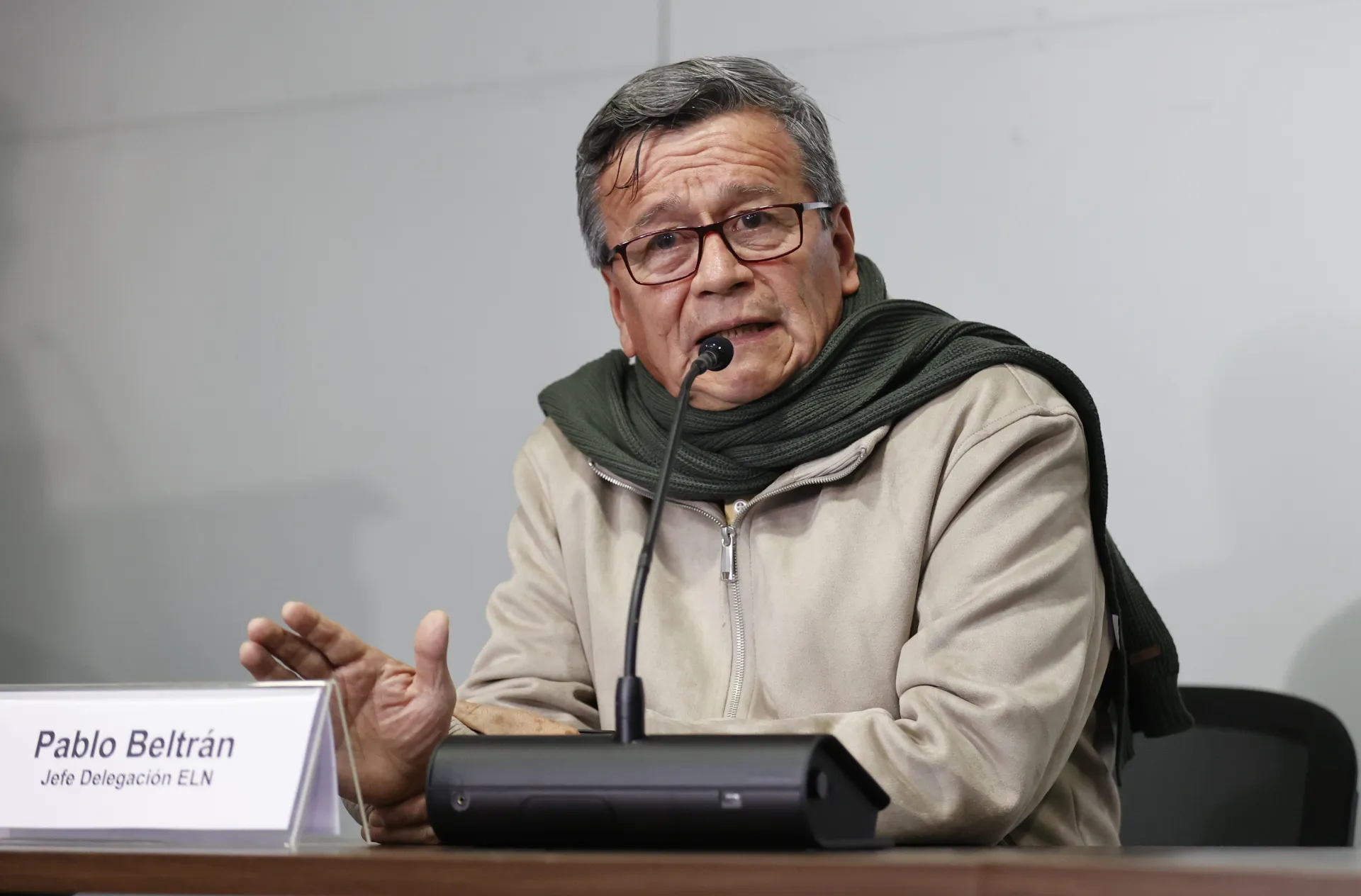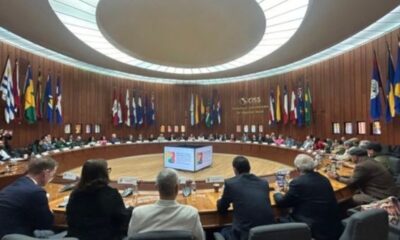International
ELN says that resuming kidnappings for economic purposes is not an ultimatum to the Government

The guerrilla of the National Liberation Army (ELN) does not believe that resuming kidnappings for economic purposes, as announced on May 6 after agreeing to its suspension in February, is an “ultimatum” to the Government but a “record” of its “will to continue looking at a search for a way out of this matter.”
This was stated in an interview with EFE by the chief guerrilla negotiator, Israel Ramírez Pineda, known as ‘Pablo Beltrán’, who assured that the announcement to end the suspension of that crime was nothing more than expected, since his commitment was to suspend it for three months until they found another solution.
This is because in Havana, when the extension of the ceasefire was negotiated, which was where this commitment of the ELN to suspend “withholdings for economic purposes” was incorporated, this was done as a sign of the goodwill of the guerrillas, he explains.
“The ELN can increasingly commit to incorporating more prohibited actions on cessation, but the ELN also needs support to sustain the cessation,” he says. That is, they expected a guerrilla financing solution to be negotiated, which has a source of income in kidnappings.
“That is the political will, but in the discussion we did not manage to reach an agreement on that, that is, when we renewed this cessation there was no agreement to include in the extension the cessation of withholdings,” said Beltrán, although even so, he adds, the ELN included its commitment “on a voluntary basis to make a unilateral cessation of three months, while we find solutions.”
However, those three months have passed since the meeting in Havana and “the Bureau (of dialogues) entered a very difficult crisis and those solutions that we left to make were not worked on. Then the three months passed, but we were not able to advance the solutions. There was a gap.”
“Then we were forced to say until May 3 was the unilateral cessation (of withholdings for economic purposes) and we hope that we will resume the discussions again, to see if we reach an agreement in that sense. So, it is not an ultimatum but a record that we have the will to continue looking at a search for a way out of this issue that is expected to be included in the prohibited actions,” Beltrán emphasizes.
The two parties have signed the first point of the six on the negotiating agenda in Caracas, but the crises and open disputes have meant that a new cycle of dialogues has not been made since the end of January.
Now they will have to be found again to, among other matters, see if the ceasefire is extended once again, which began on August 3 and will fulfill, for the first time in the history of the guerrillas, a year without breaches.
It is in that new negotiation where the ELN hopes that, if there is compliance by the Government, more prohibited actions, such as kidnappings, will be added.
Despite the fact that International Humanitarian Law (IHL) considers the taking of hostages (the capture of a civilian outside the conflict) as a war crime, for the ELN the “retention” of civilians for economic purposes is not because it is a “temporary detention.”
“That type of withholding, above all, we focus on characters who have been enriched with the corruption of the treasury. That is a policy, that is, to expropriate corrupt (…) So it is not only to expropriate for expropriate, no, it is to the corrupt,” explains Beltrán.
Thus, the guerrillas point out that “they charge tributes” and that when they do not comply, it is when “a temporary arrest is made.”
“I don’t want to compare, but there are many countries in the world that if you don’t pay taxes, they stop you. Well, that’s it, it’s a temporary detention and for us it’s not hostage-taking,” says the head of the ELN delegation at the dialogue table.
International
U.S. Senate Rejects Budget, Bringing Government Closer to Shutdown Amid DHS Dispute

The U.S. Senate voted on Thursday against a budget proposal in a move aimed at pressuring changes at the Department of Homeland Security (DHS), following the killing of two civilians during a deployment of immigration agents in Minneapolis.
All Senate Democrats and seven Republican lawmakers voted against the bill, which requires 60 votes to advance, pushing the country closer to a partial government shutdown that would cut funding for several agencies, including the Pentagon and the Department of Health.
The rejection came as Senate leaders and the White House continue negotiations on a separate funding package for DHS that would allow reforms to the agency. Proposed measures include banning Immigration and Customs Enforcement (ICE) agents from wearing face coverings and requiring them to use body-worn cameras during operations.
The vote took place just hours after President Donald Trump said he was “close” to reaching an agreement with Democrats and did not believe the federal government would face another shutdown, following last year’s record stoppage.
“I don’t think the Democrats want a shutdown either, so we’ll work in a bipartisan way to avoid it. Hopefully, there will be no government shutdown. We’re working on that right now,” Trump said during a Cabinet meeting at the White House.
International
Trump Says Putin Agreed to One-Week Halt in Attacks on Ukraine Amid Extreme Cold

U.S. President Donald Trump said on Thursday that he secured a commitment from Russian President Vladimir Putinto halt attacks against Ukraine for one week, citing extreme weather conditions affecting the region.
“Because of the extreme cold (…) I personally asked Putin not to attack Kyiv or other cities and towns for a week. And he agreed. He was very pleasant,” Trump said during a Cabinet meeting broadcast by the White House.
Trump acknowledged that several advisers had questioned the decision to make the call.
“A lot of people told me not to waste the call because they wouldn’t agree. And he accepted. And we’re very happy they did, because they don’t need missiles hitting their towns and cities,” the president said.
According to Trump, Ukrainian authorities reacted with surprise to the announcement but welcomed the possibility of a temporary ceasefire.
“It’s extraordinarily cold, record cold (…) They say they’ve never experienced cold like this,” he added.
Ukrainian President Volodymyr Zelensky later commented on the announcement, expressing hope that the agreement would be honored.
International
Storm Kristin Kills Five in Portugal, Leaves Nearly 500,000 Without Power

Storm Kristin, which battered Portugal with heavy rain and strong winds early Wednesday, has left at least five people dead, while nearly half a million residents remained without electricity as of Thursday, according to updated figures from authorities.
The revised death toll was confirmed to AFP by a spokesperson for the National Emergency and Civil Protection Authority (ANPEC). On Wednesday, the agency had reported four fatalities.
Meanwhile, E-Redes, the country’s electricity distribution network operator, said that around 450,000 customers were still without power, particularly in central Portugal.
Emergency services responded to approximately 1,500 incidents between midnight and 8:00 a.m. local time on Wednesday, as the storm caused widespread disruptions.
The Portuguese government described Kristin as an “extreme weather event” that inflicted significant damage across several regions of the country. At the height of the storm, as many as 850,000 households and institutions lost electricity during the early hours of Wednesday.
Several municipalities ordered the closure of schools, many of which remained shut on Thursday due to ongoing adverse conditions.
Ricardo Costa, regional deputy commander of the Leiria Fire Brigade, said residents continue to seek assistance as rainfall persists.
“Even though the rain is not extremely intense, it is causing extensive damage to homes,” he noted.
In Figueira da Foz, a coastal city in central Portugal, strong winds toppled a giant Ferris wheel, underscoring the severity of the storm.
-

 Central America4 days ago
Central America4 days agoGuatemala seizes over a ton of cocaine hidden in flour at Pacific port
-

 International4 days ago
International4 days agoHistoric snowstorm paralyzes Toronto after 60 centimeters of snow
-

 Central America3 days ago
Central America3 days agoGuatemala Police Arrest Prison Guard Caught in the Act of Extortion
-

 Central America3 days ago
Central America3 days agoHonduras swears in conservative president Asfura after disputed election
-

 Central America3 days ago
Central America3 days agoBukele leads public trust rankings as UCA survey highlights gains in security
-

 International4 days ago
International4 days agoSpain’s irregular migrant population rises to 840,000, study finds
-

 International2 days ago
International2 days agoFootball Fan Killed in Clashes After Colombian League Match
-

 International3 days ago
International3 days agoWinter Storm Fern Leaves 30 Dead and Over One Million Without Power Across the U.S.
-

 Central America2 days ago
Central America2 days agoGuatemala President Says Starlink Terminal Found Inside Prison
-

 Sin categoría3 days ago
Sin categoría3 days agoEight Killed in Series of Armed Attacks in Ecuador’s Manabí Province
-

 International3 days ago
International3 days agoDoomsday clock moves to 85 seconds before midnight amid rising global risks
-

 International4 days ago
International4 days agoRights group says nearly 6,000 killed in Iran protest crackdown
-

 International3 days ago
International3 days agoSpain approves plan to regularize up to 500,000 migrants in Historic Shift
-

 Sin categoría3 days ago
Sin categoría3 days agoEl Salvador Launches Fourth Year of Ocean Mission to Protect Marine Ecosystems
-

 International2 days ago
International2 days agoRubio Says U.S. Could Participate in Follow-Up Russia-Ukraine Talks
-

 International2 days ago
International2 days agoMissing Spanish Sailor Rescued After 11 Days Adrift in Mediterranean
-

 International4 days ago
International4 days agoVenezuela frees at least 80 political prisoners, NGO says
-

 International4 days ago
International4 days agoEU launches new probe into X over AI-generated fake nude images
-

 International16 hours ago
International16 hours agoU.S. Senate Rejects Budget, Bringing Government Closer to Shutdown Amid DHS Dispute
-

 International4 days ago
International4 days agoSevere winter storm grips U.S., leaves multiple dead as extreme cold persists
-

 International4 days ago
International4 days agoFrance debates ban on social media for children under 15
-

 International16 hours ago
International16 hours agoStorm Kristin Kills Five in Portugal, Leaves Nearly 500,000 Without Power
-

 International16 hours ago
International16 hours agoMan Arrested After Vehicle Crashes Into Jewish Institution in Brooklyn
-

 International16 hours ago
International16 hours agoTrump Says Putin Agreed to One-Week Halt in Attacks on Ukraine Amid Extreme Cold
































